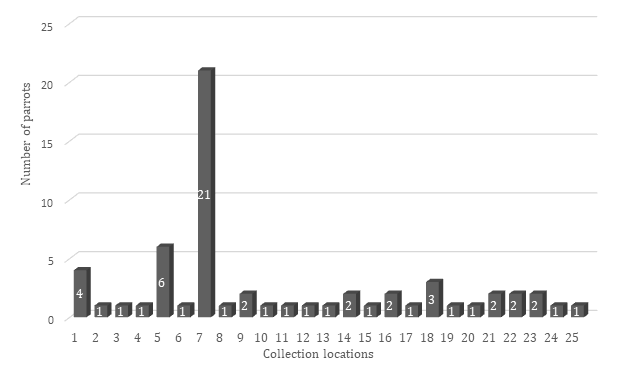Screening of Salmonella spp. and Chlamydophila psittaci in parrots domiciled in Rio Branco, Acre, Brazil
DOI :
https://doi.org/10.21708/avb.2021.15.4.10168Résumé
A large proportion of emerging infectious diseases (60.3%) globally are zoonotic pathogens, and of these, 71.8% originate from wild animals. Salmonellosis and psittacosis, diseases caused by Salmonella spp. and Chlamydophila psittaci, respectively, in wild animals are zoonoses with great risks to public health. Therefore, this study aimed to investigate the presence of Salmonella spp. and C. psittaci in parrots domiciled in Rio Branco, Acre. The animals in the study were raised as pets, and selection was performed based on convenience criteria. The birds were manually restrained to collect biological materials. Subsequently, conventional microbiological and biochemical tests were performed to identify Salmonella spp., and polymerase chain reaction analyses were conducted to identify C. psittaci and Salmonella spp. It was not possible to isolate Salmonella spp. and C. psittaci in the sampled birds. However, the presence of these bacteria in parrots cannot be ruled out because intermittent release and diagnostic limitations are widely described in the literature.
Téléchargements

Téléchargements
Publié-e
Numéro
Rubrique
Licence
Autores que publicam na Acta Veterinaria Brasilica concordam com os seguintes termos: a) Autores mantém os direitos autorais e concedem à revista o direito de primeira publicação, com o trabalho simultaneamente licenciado sob a Licença Creative Commons Attribution que permite o compartilhamento do trabalho com reconhecimento da autoria e publicação inicial nesta revista. b) Autores têm autorização para assumir contratos adicionais separadamente, para distribuição não-exclusiva da versão do trabalho publicada nesta revista (ex.: publicar em repositório institucional ou como capítulo de livro), com reconhecimento de autoria e publicação inicial nesta revista. c) Autores têm permissão e são estimulados a publicar e distribuir seu trabalho online (ex.: em repositórios institucionais ou na sua página pessoal) a qualquer ponto antes ou durante o processo editorial, já que isso pode gerar alterações produtivas, bem como aumentar o impacto e a citação do trabalho publicado (Veja O Efeito do Acesso Livre).


 Esta obra está licenciada com uma Licença
Esta obra está licenciada com uma Licença 